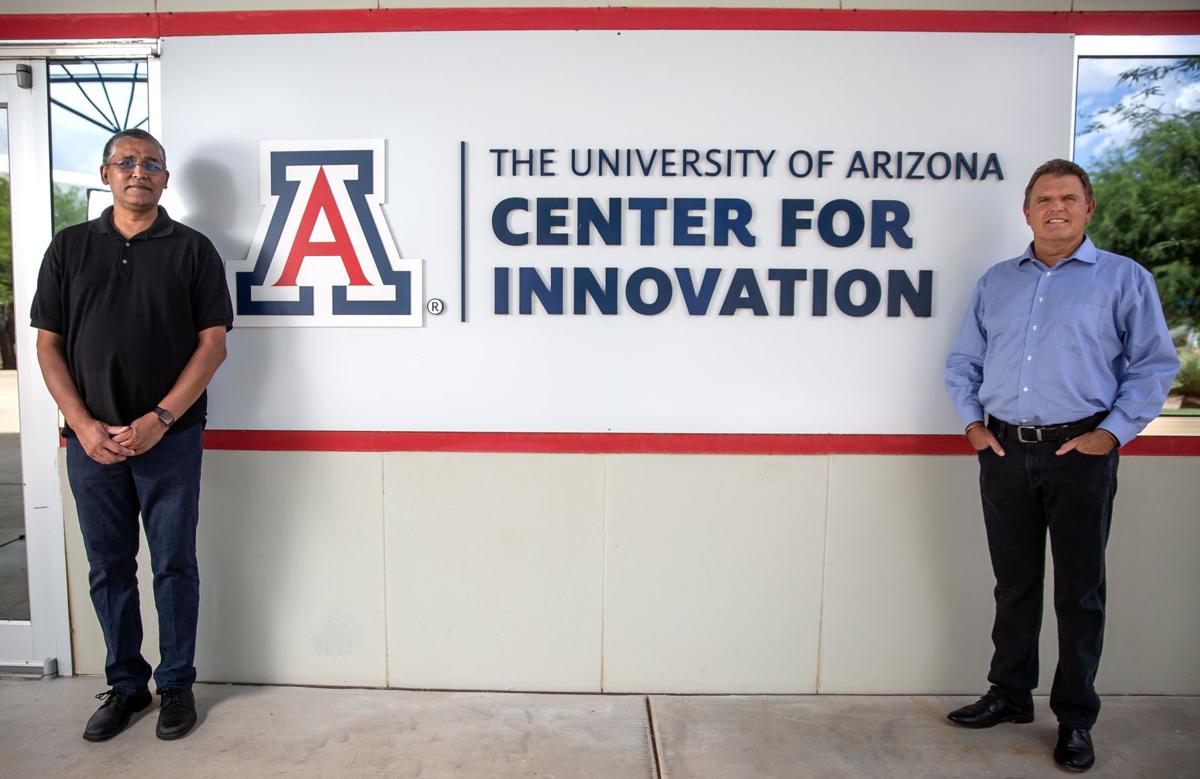A Tucson startup company is working on vaccine technology that could aid in the fight against COVID-19 and pathogens that may hit human populations in the future.
The startup’s efforts are getting a boost as the newest member of the University of Arizona’s technology business incubator.
Reparvi, founded in Tucson last year, recently won the UA Center for Innovation’s Sponsored Launch Fueled by Perkins Coie competition, receiving a sponsored yearlong admission into the UACI’s incubation program.
The company, UACI’s 24th client startup, also was awarded a cash prize of $4,000 and 10 hours of legal assistance from the international law firm Perkins Coie LLP.
Reparvi was co-founded by Deepak Agrawal, a Ph.D. biochemist and the company’s head of discovery and development; and Pete Bantock, head of strategy and a longtime biotech business executive who formerly worked at Tucson-based Accelerate Diagnostics and Roche Tissue Diagnostics in Oro Valley.
Agrawal initially developed the foundations of the gene-delivery technology in his lab in the mid-2000s, while he was an assistant member of the H. Lee Moffitt Cancer Center and Research Institute in Tampa, Florida.
Reparvi’s “Cell Repair Engineering” platform is designed to enable advanced cell-based engineering through delivery of genes.
With COVID-19 in mind, Agrawal said the company plans to initially deploy the technology to make “engineered bioparticles,” or “virus-like particles,” to create a new generation of vaccine candidates.
The technology could be key to developing vaccines for pathogens like the novel coronavirus that are zoonotic, meaning they spread from animals to humans.
Because the COVID-19 and other zoonotic viruses have shown the ability to evade human immune systems, new methods are needed to rapidly design vaccines to prevent their spread, Agrawal said.
That need is only growing, he said, citing a 2020 United Nations report that found that 75% of all emerging infectious diseases are zoonotic.
“When it jumps into humans, it’s actually something where humans are naïve, it’s something humans have never seen because it existed in an animal host,” Agrawal said. “That’s why COVID-19 has been so devastating, because nobody has any immunity to it and it has great transmissibility.”
Vaccines traditionally have been developed using live or inactive viruses or bacteria to provoke an immune response.
More recently, several companies worldwide are racing to develop vaccines for COVID-19 based on messenger RNA, or mRNA — the molecule that puts DNA instructions into action — that essentially trick the body into producing proteins that mimic those produced by a pathogen.
Reparvi’s approach is different still.
“Our take is that it’s possible to engineer virus-like particles to program a cell to make all the parts you need for the virus,” Agrawal said, adding that also includes engineering the bioparticles to shape the immune response for broad protection and long-lasting response.
Agrawal said he and Bantock expect the UACI program to help prepare the company to raise initial capital to further develop the gene-delivery technology, with an initial focus on perfecting methods to produce bioparticles on a large scale.
He said he decided to launch Reparvi in Tucson after doing some work here about a decade ago and because of the reception he received from UACI.
Agrawal said a mutual friend introduced him to Bantock, who was winding down his work at Roche and provided deep and much-needed biotech business experience.
Eric Smith, executive director of UACI, said Reparvi was picked from about 20 applicants for the center’s inaugural Sponsored Launch program, which partners with local companies to sponsor a startup’s incubation.
Applicants must be based in Arizona and are judged on their innovative solutions, sustainability of their business models, their commitment to commercializing their technologies and their potential to make a significant contribution to the community, Smith said.
“Ultimately, what really set his team apart was their commitment to commercialize their invention,” Smith said.
While many biotech companies, including startups, are pivoting to address COVID-19, Reparvi is working on a technology that can be adapted to different pathogens in the future, he added.
“It’s a platform technology, so you can retool it so you can solve similar problems,” Smith said.





